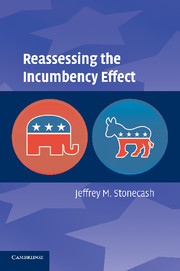Preface
Published online by Cambridge University Press: 06 July 2010
Summary
It is widely presumed that, in recent decades, House incumbents have been able to increase their vote percentages. Incumbents have always had an advantage over challengers. The argument is that this advantage has increased. The implications of this conclusion for democracy are troubling. It raises issues about the fairness of elections and the responsiveness of legislators. Incumbents may be able to exploit the advantages of office, boost their vote percentages, and become more electorally secure. That, in turn, may make them less responsive to voters and changes in public opinion.
This book challenges the conclusion that the electoral fortunes of incumbents have improved. It then presents an alternative interpretation of the trends that have occurred. The argument of this book is that the evidence presented to support this conclusion does not hold up to reanalysis. Incumbents as a group have not experienced an increase in their vote percentages. Other indicators of incumbent fortunes, to be reviewed in later chapters, also do not support the conclusion that is so often presented. Furthermore, the quantitative statistical analyses of the incumbency effect that have been presented to support the conclusion are fatally flawed.
Not only does the evidence of an increased incumbency effect fail to hold up, but the focus on all incumbents leads us away from a more relevant interpretation of change. There was change in the mid-1960s, but it involved a significant and sustained improvement in the fortunes of only Republican House members.
- Type
- Chapter
- Information
- Reassessing the Incumbency Effect , pp. ix - xiiPublisher: Cambridge University PressPrint publication year: 2008



